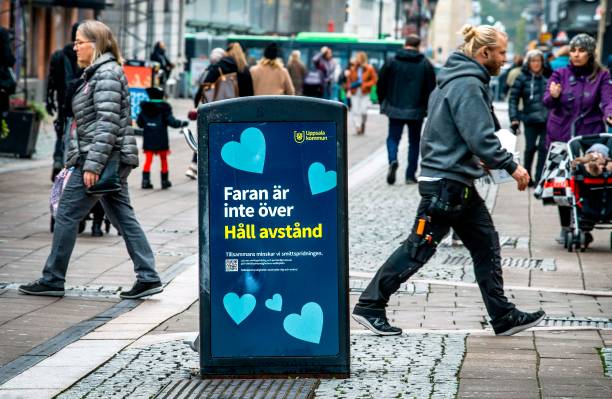Sweden U-turns on herd immunity with tighter lockdown restrictions

Sweden has U-turned on its herd immunity approach to the pandemic by introducing tighter lockdown restrictions, after health chiefs warned the country has failed to prepare for a second wave.
Swedish Prime Minister Stefan Lofven today announced new limitations on public gatherings to eight people across the country, down from a previous upper limit of 300.
“This is the new norm for the entire society,” Lofven told a news conference this morning. “Don’t go to gyms, don’t go to libraries, don’t host dinners. Cancel.”
It comes as Sweden grapples with a second wave of the pandemic that has seen record daily numbers of infections and surging hospital admissions.
The country yesterday recorded 5,990 confirmed Covid cases — its highest ever daily figure.
Former chief epidemiologist Annike Linde warned that the surge in cases proved Sweden’s herd immunity approach failed to allay a second wave of the virus.
She told the Telegraph: “Wishful thinking — when you don’t believe in the worst scenario — has been guiding Swedish decisions too much.
“The Swedish authorities have been slow all the time. Instead of being proactive, they’ve run after the virus, and the virus has been able to spread too much before they take action.”
Sweden raised eyebrows across the continent as it adopted a lax approach to the virus with the hopes of achieving a level of herd immunity across the population.
Bars, restaurants and shops remained open across the country while the rest of Europe hurtled into nationwide lockdowns to prevent the spread of infection.
It was subsequently hailed as an example by those opposed to sweeping lockdowns, with the country only recording 6,000 or so deaths since the start of the pandemic, compared to the UK’s 52,000.
However, Sweden was last week forced to scrap its herd immunity approach as the winter weather accelerated the spread of the virus across the country.
Interior minister Mikael Damberg said the new limit on gatherings — far lower the 50 allowed during the initial outbreak in spring — would be in place for at least four weeks.
Lofven today reinstated his view that Sweden does “not believe in a total lockdown”.
“We believe that the measures we have taken … are appropriate,” the PM said.